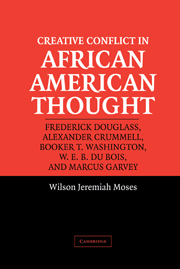Book contents
- Frontmatter
- Contents
- Acknowledgments
- Preface: Struggle, Challenge, and History
- 1 Introduction: Reality and Contradiction
- FREDERICK DOUGLASS: THE INDIVIDUALIST AS RACE MAN
- 2 Frederick Douglass: Superstar and Public Intellectual
- 3 Where Honor Is Due: Frederick Douglass as Representative Black Man
- 4 Writing Freely? Frederick Douglass and the Constraints of Racialized Writing
- ALEXANDER CRUMMELL: THE ANGLOPHILE AS AFROCENTRIST
- BOOKER TALIAFERO WASHINGTON: THE IDEALIST AS MATERIALIST
- W. E. B. DU BOIS: THE DEMOCRAT AS AUTHORITARIAN
- MARCUS MOZIAH GARVEY: THE REALIST AS ROMANTIC
- CONCLUSION: RESCUING HEROES FROM THEIR ADMIRERS
- Index
4 - Writing Freely? Frederick Douglass and the Constraints of Racialized Writing
Published online by Cambridge University Press: 07 November 2009
- Frontmatter
- Contents
- Acknowledgments
- Preface: Struggle, Challenge, and History
- 1 Introduction: Reality and Contradiction
- FREDERICK DOUGLASS: THE INDIVIDUALIST AS RACE MAN
- 2 Frederick Douglass: Superstar and Public Intellectual
- 3 Where Honor Is Due: Frederick Douglass as Representative Black Man
- 4 Writing Freely? Frederick Douglass and the Constraints of Racialized Writing
- ALEXANDER CRUMMELL: THE ANGLOPHILE AS AFROCENTRIST
- BOOKER TALIAFERO WASHINGTON: THE IDEALIST AS MATERIALIST
- W. E. B. DU BOIS: THE DEMOCRAT AS AUTHORITARIAN
- MARCUS MOZIAH GARVEY: THE REALIST AS ROMANTIC
- CONCLUSION: RESCUING HEROES FROM THEIR ADMIRERS
- Index
Summary
“Luckily for the World, Dumas was born in France and not in America, where he would have been circumscribed and might have used his genius in the struggle for elementary liberty like his notable Negro contemporary, Frederick Douglass.” This observation by J.A. Rogers, the unassailable icon of Afro-Atlantic history, outlines the fundamental struggle of Douglass' literary career. His development as artist and intellectual was circumscribed by the time and place in which he was born. Almost everything he wrote was informed by the struggle against slavery, racial discrimination, and the indelible imprint they left on his life.
Douglass' major work was an autobiography, which was dominated by the themes of his personal struggle against slavery, humiliation, stereotyping, and sexual repression. He was apologetic about the autobiographical nature of his writing. “I write freely of myself, not from choice, but because I have, by my cause, been morally forced into thus writing,” said Douglass in the fourth and final version of his autobiography. Writing freely, and yet lacking choice; writing freely and yet feeling forced. These contradictions did not result from a careless formulation of ideas, but from the dilemma of Douglass' life and literary career.
Douglass' early development as a writer had been assisted but also hemmed in by white friends who had strong ideas about what roles black Americans ought to play in American literary and intellectual life as well as in their own emancipation.
- Type
- Chapter
- Information
- Creative Conflict in African American Thought , pp. 61 - 80Publisher: Cambridge University PressPrint publication year: 2004



